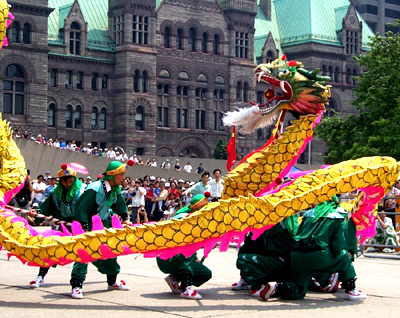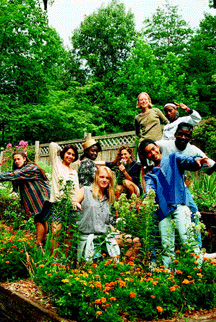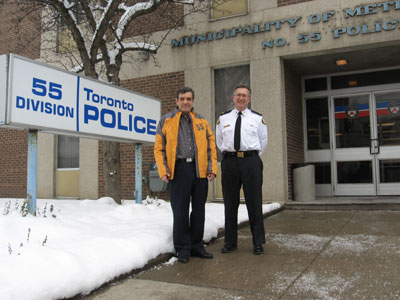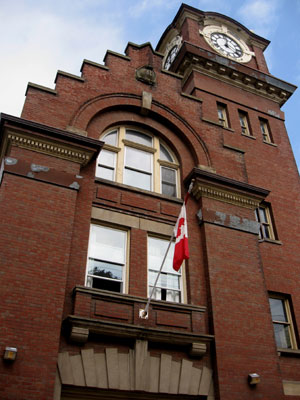The demographic picture of Alexandra Park has changed considerably over the years. According to a recent Metro Toronto Housing Authority Report (previously MTHA, now Toronto Housing Corporation), there are 332 families with children who make up 81% of households. 84% are single parent, usually female-led, families. 73% of the population is made up of visible minorities. Out of this group, 24% are Chinese, 17% are South-East Asian, 16% are Black, 6% are South Asian and 5% are Hispanic. 19.4% of the Alexandra Park population is youth aged between 13 and 20, making up a total of 391 youth community members. Isolated minorities that are not visible in the community (in terms of participation in programs and accessing services) comprise of the largest minority groups: the Chinese and Vietnamese communities.
3. You also work with local entrepreneurs on special events. You recently held a special Christmas dinner jointly with G.A.P Adventures. How did that come about?
Almost all of SCCC programs operate in partnership with local businesses, foundations, community groups and involved individuals. SCCC has partnered with Tim Horton’s and McDonald’s to support events and activities for children. In November 2005 Bruce Poon Tip of G.A.P Adventures approached SCCC about the possibility of partnering with SCCC provide a Christmas event for children in our neighbourhood.

The G..A.P-sponsored Christmas party
4. Please tell us about the all the work that went into organizing this party.
Scadding Court staff and volunteers worked with G.A.P Adventures staff to set-up the tables and chairs and do last minute food preparations for the event. 20 turkeys were cooked by G.A.P Adventures staff the night before and brought to the centre first thing in the morning. Staff and volunteers set up and ran various stations for children’s activities through the party. Extra food was donated to our local food bank.
5. Please tell us more about the party itself, the food and the celebrations. How many people participated?
There were about 200 children here for the event that day. The party also featured an appearance by Santa to pass out gifts provided by the CHUM CITY Christmas Wish Foundation and G.A.P Adventures. The event was well- received by the local community and local press and City-TV were on hand to capture the event.

A very G.A.P Christmas at the SCCC…..
6. Please tell us more about your special projects. What are the Hate Crime Project, the “Investing in our Diversity Scholarships” and what is the Gone Fishing project?
Hate Crime Project
The Hate Crime Project is a train-the-trainer project for youth from marginalized communities in Toronto. The goal is to empower participants by providing opportunities for hands-on learning and community facilitation experience. The project involves 10 youth from communities across Toronto, who are participating in the training and will eventually create and lead workshops in the community on hate & hate crime.
Investing in our Diversity Scholarships
The Investing in our Diversity Scholarships are a series of scholarships presented by Scadding Court Community Centre (SCCC) and our partners to graduating students; in 2005 alone we provided $20,000 in scholarships and $8,000 in bursaries to young people, since 2003 the program has provide $60,000 to young people for their education.
In 2006 Scadding Court Community Centre and its community partners will provide eight $4000 scholarship awards graduating secondary students who live in the SCCC catchment area, TCH residences in Regent Park, Pelham Park and the Lawrence Heights community that are involved with diversity and anti-racism projects in the community. By focusing on young people doing anti-racism work in their schools and community, SCCC is acknowledging the commitment of a new generation of leaders.
The Gone Fishin’ Project
The annual Gone Fishin’ Project transforms the Scadding Court Community Centre indoor pool into a week-long trout fishing pond. To many urban citizen’s fishing is seen as a rural activity that only those who live in the countryside can engage in. The Gone Fishin’ Project provides area school children and children living with physical disabilities and special needs, low-income residents and the general public with the opportunity to experience the excitement of catching fresh rainbow or albino trout right in their own backyard. As well, through this project we hope to continue to encourage low-income residents to think about including more fresh fish into their diets.
Gone fishin’….
8. Please tell us about your special events including the Toronto Chinatown Festival, the Dundas Community Festival, the Black History Month Celebrations and the Lunar New Year Celebrations.
Toronto Chinatown Festival
The Toronto Chinatown Festival is presented as a multicultural event open to members of the general public. While the primary audience are residents of the immediate community who are of South East Asian heritage, and features traditional Chinese opera, Vietnamese pop music, jazz, children’s activities & martial arts demonstrations. The festival also features a marketplace for food and craft vendors
Lunar New Year Celebration
Every year, SCCC celebrates Lunar New Year with a local celebration. Activities this annual event include Lunar New Year exhibits, presentations, artwork, music, activities for children, “Red Pocket” distribution and cross-cultural education activities. It is important for the centre to promote awareness around the wealth of diversity within the South-East Asian community and celebrate these occasions with our local community.
Black History Month
SCCC uses Black History Month as a time to explore and educate our community and our community on history of Africans worldwide. Film screenings, lectures, concerts, school programs and displays are just some of the things we do to celebrate the rich history of African history.
Dundas Community Festival
The Dundas Community Festival (previously known as the Dundas Day Festival) grew out of a community revitalization effort to improve and beautify Dundas street and the surrounding community to make it an attractive neighbourhood for community members. Local groups, business communities and the arts sector came together to generate ideas on revitalizing the area, and the Festival became one key initiative that everyone participated in, from planning and organizing to actually running it on the day of the event.
Toronto youth playing basketball in China






